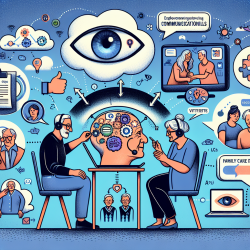Effective communication is a cornerstone of successful therapy and care, especially when working with children or individuals with cognitive impairments such as Alzheimer's disease. As practitioners, it is essential to continually improve our skills and strategies to create better outcomes for those we serve. The TRACED program, detailed in the research article "Training family care partners to communicate effectively with persons with Alzheimer's disease: The TRACED program," provides valuable insights and actionable strategies that can be applied in various therapeutic contexts.
The TRACED program (Training in Communication Enhancement for Dementia) is designed to help family care partners improve their communication with loved ones who have Alzheimer's disease. The program integrates compensatory strategies that address cognitive and communication limitations with connecting strategies that focus on relational and emotional aspects of communication. This dual approach ensures that communication is both effective and meaningful.
Key Findings from the TRACED Program
The TRACED program was evaluated through a phase one pilot study, which demonstrated its feasibility and led to improvements in its content and delivery. The study found that care partners who participated in the program reported significant improvements in their communication skills and the quality of their interactions with their loved ones. Key components of the TRACED program include:
- Compensatory Strategies: These strategies aim to minimize the impact of cognitive and linguistic declines by reducing information processing demands. Examples include using one-idea sentences, asking questions that do not rely on recent memory, and eliminating distractions.
- Connecting Strategies: These strategies focus on affirming the listener's retained abilities, acknowledging their need for meaningful communication, and supporting their expression of self. Examples include encouraging participation, inviting engagement, and facilitating conversation.
Implementing TRACED Strategies in Practice
As a practitioner, you can integrate TRACED strategies into your therapy sessions to enhance communication with your clients. Here are some practical steps to get started:
- Educate Yourself: Familiarize yourself with the principles and strategies of the TRACED program. Understanding the theoretical underpinnings will help you apply the strategies effectively.
- Practice Compensatory Strategies: Begin by incorporating one-idea sentences and eliminating distractions during your sessions. Monitor your speech rate and intonation to ensure clarity and understanding.
- Use Connecting Strategies: Focus on building a relational connection with your clients. Encourage their participation, invite their input, and facilitate conversations that are meaningful to them.
- Reflect and Adjust: Continuously evaluate the effectiveness of your communication strategies. Solicit feedback from your clients and their families, and make adjustments as needed to improve outcomes.
Encouraging Further Research
The findings from the TRACED program highlight the importance of effective communication in caregiving and therapy. However, more research is needed to explore the broader applications of these strategies in different therapeutic contexts. As practitioners, we should advocate for and participate in research initiatives that aim to enhance communication and care for individuals with cognitive impairments.
To read the original research paper, please follow this link: Training family care partners to communicate effectively with persons with Alzheimer's disease: The TRACED program.










